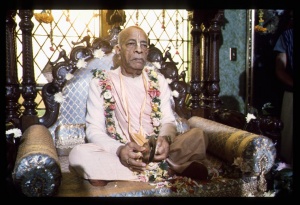CC Madhya 22.162 (1975): Difference between revisions
(Vanibot #0027: CCMirror - Mirror CC's 1996 edition to form a basis for 1975) |
(Vanibot #0020: VersionCompareLinker - added a link to the Version Compare feature) |
||
| Line 2: | Line 2: | ||
<div style="float:left">'''[[Sri Caitanya-caritamrta (1975)|Śrī Caitanya-caritāmṛta (1975)]] - [[CC Madhya (1975)|Madhya-līlā]] - [[CC Madhya 22 (1975)|Chapter 22: The Process of Devotional Service]]'''</div> | <div style="float:left">'''[[Sri Caitanya-caritamrta (1975)|Śrī Caitanya-caritāmṛta (1975)]] - [[CC Madhya (1975)|Madhya-līlā]] - [[CC Madhya 22 (1975)|Chapter 22: The Process of Devotional Service]]'''</div> | ||
<div style="float:right">[[File:Go-previous.png|link=CC Madhya 22.161 (1975)|Madhya-līlā 22.161]] '''[[CC Madhya 22.161 (1975)|Madhya-līlā 22.161]] - [[CC Madhya 22.163 (1975)|Madhya-līlā 22.163]]''' [[File:Go-next.png|link=CC Madhya 22.163 (1975)|Madhya-līlā 22.163]]</div> | <div style="float:right">[[File:Go-previous.png|link=CC Madhya 22.161 (1975)|Madhya-līlā 22.161]] '''[[CC Madhya 22.161 (1975)|Madhya-līlā 22.161]] - [[CC Madhya 22.163 (1975)|Madhya-līlā 22.163]]''' [[File:Go-next.png|link=CC Madhya 22.163 (1975)|Madhya-līlā 22.163]]</div> | ||
{{CompareVersions|CC|Madhya 22.162|CC 1975|CC 1996}} | |||
{{RandomImage}} | {{RandomImage}} | ||
==== TEXT 162 ==== | ==== TEXT 162 ==== | ||
| Line 11: | Line 10: | ||
<div class="verse"> | <div class="verse"> | ||
:na karhicin mat-parāḥ śānta-rūpe | :na karhicin mat-parāḥ śānta-rūpe | ||
:naṅkṣyanti no me | :naṅkṣyanti no me 'nimiṣo leḍhi hetiḥ | ||
:yeṣām ahaṁ priya ātmā sutaś ca | :yeṣām ahaṁ priya ātmā sutaś ca | ||
:sakhā guruḥ suhṛdo daivam iṣṭam | :sakhā guruḥ suhṛdo daivam iṣṭam | ||
| Line 20: | Line 19: | ||
<div class="synonyms"> | <div class="synonyms"> | ||
na—not; karhicit—at any time; mat-parāḥ—devotees of Me; śānta-rūpe—O mother, the symbol of peacefulness; naṅkṣyanti—will perish; | na—not; karhicit—at any time; mat-parāḥ—devotees of Me; śānta-rūpe—O mother, the symbol of peacefulness; naṅkṣyanti—will perish; no—nor; me—My; animiṣaḥ—time; leḍhi—licks up (destroys); hetiḥ—weapon; yeṣām—of whom; aham—I; priyaḥ—dear; ātmā—the Supersoul; sutaḥ—the son; ca—and; sakhā—friend; guruḥ—spiritual master; suhṛdaḥ—well-wisher; daivam—the Deity; iṣṭam—chosen. | ||
</div> | </div> | ||
| Line 27: | Line 26: | ||
<div class="translation"> | <div class="translation"> | ||
" 'My dear mother, Devahūti! O emblem of peace! My weapon, the disc of time, never vanquishes those for whom I am very dear, for whom I am the Supersoul, the son, friend, spiritual master, well-wisher, worshipable Deity and desired goal. Since the devotees are always attached to Me, they are never vanquished by the agents of time.' | |||
</div> | </div> | ||
| Line 34: | Line 33: | ||
<div class="purport"> | <div class="purport"> | ||
This was spoken by Kapiladeva to His mother Devahūti and is recorded in Śrīmad-Bhāgavatam ([[SB 3.25.38]]). Kapiladeva instructed His mother in sāṅkhya-yoga, but the importance of bhakti-yoga is mentioned here. Later sāṅhkya-yoga was imitated by atheists, whose system was founded by a different Kapiladeva, Ṛṣi Kapiladeva. | This was spoken by Kapiladeva to His mother Devahūti and is recorded in Śrīmad-Bhāgavatam ([[SB 3.25.38|3.25.38]]). Kapiladeva instructed His mother in sāṅkhya-yoga, but the importance of bhakti-yoga is mentioned here. Later sāṅhkya-yoga was imitated by atheists, whose system was founded by a different Kapiladeva, Ṛṣi Kapiladeva. | ||
</div> | </div> | ||
Latest revision as of 14:20, 27 January 2020

A.C. Bhaktivedanta Swami Prabhupada
TEXT 162
- na karhicin mat-parāḥ śānta-rūpe
- naṅkṣyanti no me 'nimiṣo leḍhi hetiḥ
- yeṣām ahaṁ priya ātmā sutaś ca
- sakhā guruḥ suhṛdo daivam iṣṭam
SYNONYMS
na—not; karhicit—at any time; mat-parāḥ—devotees of Me; śānta-rūpe—O mother, the symbol of peacefulness; naṅkṣyanti—will perish; no—nor; me—My; animiṣaḥ—time; leḍhi—licks up (destroys); hetiḥ—weapon; yeṣām—of whom; aham—I; priyaḥ—dear; ātmā—the Supersoul; sutaḥ—the son; ca—and; sakhā—friend; guruḥ—spiritual master; suhṛdaḥ—well-wisher; daivam—the Deity; iṣṭam—chosen.
TRANSLATION
" 'My dear mother, Devahūti! O emblem of peace! My weapon, the disc of time, never vanquishes those for whom I am very dear, for whom I am the Supersoul, the son, friend, spiritual master, well-wisher, worshipable Deity and desired goal. Since the devotees are always attached to Me, they are never vanquished by the agents of time.'
PURPORT
This was spoken by Kapiladeva to His mother Devahūti and is recorded in Śrīmad-Bhāgavatam (3.25.38). Kapiladeva instructed His mother in sāṅkhya-yoga, but the importance of bhakti-yoga is mentioned here. Later sāṅhkya-yoga was imitated by atheists, whose system was founded by a different Kapiladeva, Ṛṣi Kapiladeva.